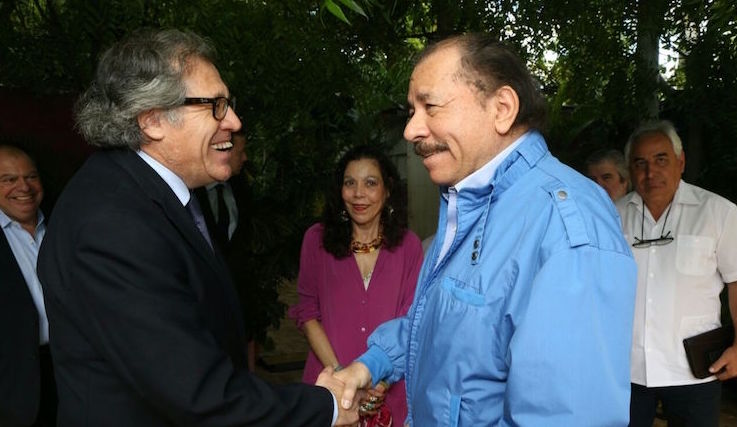20 de marzo 2017

The Return of the Military

PUBLICIDAD 1M
PUBLICIDAD 4D
PUBLICIDAD 5D
Accuses Maduro of violating the Inter-American Diplomatic Charter, while praising agreement with Ortega

En el siglo XXI al monstruo de las dictaduras le han crecido nuevas cabezas. No se engañe pensando que todas son iguales. Lea: ¿Qué decirle a Luis Almagro sobre Nicaragua?
A day after Luis Almagro proposed to suspend Venezuela from the Organization of American States (OAS), claiming that Nicolas Maduro’s government had violated the Inter-American Democratic Charter, the same OAS Secretary General published a video where he praised the dialogue the body was upholding with Comandante Daniel Ortega’s government in Nicaragua.
While accusing the Chavista government in Venezuela of being “inhumane”, and demanding “full general elections as soon as possible,” Almagro endorsed the creation of a mission “to strengthen institutionalism” in Nicaragua, which has been crushed by Ortega’s government.
The OAS Secretary General announced the arrival of an election monitoring mission, as was agreed in the memorandum of understanding which was signed by both parties, and where the president of the Nicaraguan Supreme Electoral Council, Roberto Rivas, accused of electoral fraud and corruption, was established as the counterpart on electoral matters.
“We will outline the precise details of the mission very soon, including its objectives and respective responsibilities,” Almagro stated. “Meanwhile, we have agreed with Nicaragua that the OAS will be present in the municipal elections in November with an election monitoring mission which will implement the organization’s policies and standards.”
What surprised the country’s outlawed opposition the most, which came in the form of the government’s policy decision, was Almagro’s statement about “these agreements being the outcome of a dialogue which we initiated last October with President Ortega’s government and with a great number of political and social organizations.”
The lawyer and former liberal party congressman, Jose Pallais, claims that the documents signed by Ortega and Almagro don’t include the position of the country’s opposition and organizations which the secretary general has mentioned, and there has been no inclusive dialogue in the country.
“When Almagro came to Nicaragua, all there was was a briefing session. He listened but there wasn’t an exchange of ideas. The word “dialogue” has been misused here,” Pallais claims. “Almagro is responding to the widespread criticism he is receiving for the double standard he has shown in his attitude towards Venezuela and Nicaragua,” he added.
According to Pallais, both Maduro and Ortega’s regimes have violated the Inter-American Democratic Charter and he labels both of them “dictatorships” which have overthrown institutionalism, but the Sandinista regime has done this “to a greater extent”.
“When Maduro had the support of his people, there were free elections. Ortega has engaged in fraud for the last five elections to ensure he stays in power,” Pallais pointed out. Both of them have violated the agreements established in the Inter-American Democratic Charter, and it’s truly remarkable that Almagro is asking one of them to comply with the Charter while it keeps quiet about what the other one is doing, and protects this lack of democracy which Ortega has denied the Nicaraguan people.”
In Venezuela, Maduro’s government has called the OAS “coup-inciting”. For now, Ortega’s government hasn’t said anything about Almagro’s position against its ally’s government and economic supplier, Nicolas Maduro. FSLN legislator Jacinto Suarez only said that “we’ll have to see if this measure comes into play” by Almagro because “there isn’t the votes in the OAS to exclude Venezuela.”
“You will hear Nicaragua’s position, when it’s convenient and at the right time to do so,” Suarez said when asked if Ortega’s government was going to condemn Almagro’s decision with regard to Venezuela, and whether it would keep its agreements with Nicaragua in force.
According to Maduro’s government, “Almagro is leading the hemispheric Fascist Right which pester, harrass and viciously attack Venezuela, unscrupulously and without any kind of morale, characterized by the unlawful and fraudulent forging of false positives against our sacred Homeland.”
Constitutional lawyer Gabriel Alvarez believes that if Maduro and Ortega’s regimes are similar in the fact that they don’t believe in democratic principles, beyond using them as a key way to remain in power, the invocation of violations of the Inter-American Democratic Charter by Almagro against Caracas will not hold a double standard when compared to Nicaragua.
Alvarez explained the decision claiming that they are two “different realities.” Venezuela is suffering a humanitarian crisis; it goes much further than being just political or social. There isn’t any food, hospitals don’t have supplies and the crisis can’t be contained by Maduro’s government.
“In Venezuela, there is a cross-sectional humanitarian crisis, while there is certain stability in Nicaragua,” Alvarez clarified. “The strategy being used with Venezuela is different. Almagro wants to get results with Nicaragua without having to make much effort,” Alvarez said, referring to the OAS’ failed attempts to mediate in Venezuela.
According to Alvarez, the good relationship that Ortega has with the Superior Council of Private Enterprise (COSEP) is very important to the OAS. “The relationship with the private sector is logical for the organization when compared to the case of Venezuela, where the entire productive framework has been destroyed,” he pointed out.
Alvarez said that Ortega’s intention with this “dialogue” is to win some time in order to avoid approval of the NicaAct, a US initiative which would impose economic sanctions on Nicaragua.
The constitutional lawyer warned that Almagro’s dealings with Ortega could change if the agreements made with the OAS are not met.
This article has been translated from Spanish by Havana Times.
Archivado como:
PUBLICIDAD 3M
Periodista. Destaca en cobertura a violaciones de derechos humanos: desplazamiento forzado, tráfico ilegal en territorios indígenas, medio ambiente, conflictos mineros y ejecuciones extrajudiciales. Premio Iberoamericano Rey de España 2018.
PUBLICIDAD 3D